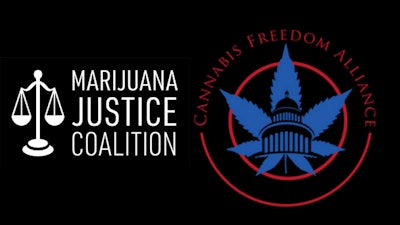
Two coalitions for comprehensive cannabis reform, the Marijuana Justice Coalition and the Cannabis Freedom Alliance, have released a joint letter calling for President Joe Biden to support removing cannabis from the Controlled Substances Act.
This letter, dated Nov. 2, comes just days after Representatives Earl Blumenauer (D-OR), David Joyce (R-OH), Barbara Lee (D-CA), and Brian Mast (R-FL) and 27 other members of Congress penned a similar letter to U.S. Drug Enforcement Administration (DEA) Administrator Anne Milgram to “recognize the merits of full descheduling and work with congressional leaders to ensure this happens.”
The letter also comes two months after the U.S. Department of Health & Human Services sent its recommendation to reschedule cannabis to the DEA. Cannabis is a Schedule I drug, which means in the federal government's eyes, it is one with no recognized medical benefit and a high potential for abuse like other substances in the class, including heroin, LSD, methaqualone and ecstasy. The HHS is recommending the plant instead fall to Schedule III, which would place it among drugs like Tylenol with codeine and ketamine, substances considered to be less dangerous than those listed on Schedule I and II.
But the dual coalitions say rescheduling is not enough.
In a press release about the letter, Justin Strekal, founder of Better Organizing to Win Legalization and a member of the Marijuana Justice Coalition, said rescheduling cannabis instead of descheduling the plant should be considered "political malpractice."
According to the press release, "The definition of decriminalization requires that there be no criminal penalties associated with simple possession, therefore the only way for President Biden to keep his campaign promise would be to remove marijuana from the Controlled Substances Act, or at minimum issue guidance directives for federal enforcement agencies to treat is as unscheduled, as the other scheduled statuses maintain criminal penalties for possession without a specialized prescription."
“Never before has ending marijuana criminalization enjoyed this level of organized cross-ideological support," Strekal said in the press release. "Thanks to leadership from the bipartisan Congressional Cannabis Caucus and leaders like those in the Marijuana Justice Coalition and Cannabis Freedom Alliance, prohibition will soon be a thing of the past."
Read the full letter below:
"Dear President Biden,
We are writing to express our gratitude for your willingness to acknowledge the failure of marijuana prohibition and your commitment to decriminalize the substance.
As leading coalitions working closely with both sides of the aisle in Congress to find a legislative solution, the Marijuana Justice Coalition and the Cannabis Freedom Alliance represent a diverse range of non-profit and public interest groups. We are writing with a unified voice to emphasize that only by descheduling marijuana from the Controlled Substances Act (CSA) can you fulfill your promise to the American people regarding cannabis decriminalization.
According to the most recent FBI data, nearly 250,000 individuals were arrested for marijuana related charges nationwide in 2021. [Editor's Note: For more, read CBT's article on FBI cannabis arrest data here.] People arrested for marijuana often face severe penalties, including months of prison or jail time and thousands of dollars in fines. Incarceration or an arrest creates barriers to securing gainful employment, education, and housing opportunities. While people of all races tend to use marijuana at the same rate, Black individuals are arrested three times more often than their white counterparts for the same offense.
Currently, the cannabis marketplace is regulated by 48 states through various regulatory systems. In our federal system, these laboratories of democracy should not be impeded in their development of effective measures to ensure public safety and promote public health. Any action to move marijuana to another CSA schedule rather than removing it would simply maintain federal criminalization of these programs, licensed companies, and individuals operating in a fully legal manner under existing state rules and regulations. Further, this mere change of scheduling classification as opposed to descheduling would not alleviate existing distrust in law enforcement around cannabis given the supermajority public support for ending criminalization.
For those reasons and more, we sincerely request that you oppose merely rescheduling cannabis under the CSA and instead urge you to deschedule the substance entirely, allowing state-based regulatory programs to function as intended without unnecessary federal interference. We further urge you to use your influence to encourage Congress to pass comprehensive marijuana descheduling legislation that includes a well-thought-out plan for reasonable federal regulation and for implementing interstate commerce that protects public health and the ability for small businesses to thrive in the emerging legal marketplace.
Now is the time to end federal marijuana criminalization, Mr. President, not to rebrand it.
The Marijuana Justice Coalition and Cannabis Freedom Alliance"
Founded in 2018, the Marijuana Justice Coalition comprises of drug policy-focused organizations, in addition to civil rights, criminal justice, immigration, and directly impacted-led organizations united in the goal of passing federal marijuana reform that both acknowledges the disproportionate harm faced by Black, brown, and low-income communities, and works toward repairing this harm.
The Cannabis Freedom Alliance (CFA) seeks to end the prohibition
and criminalization of cannabis in the United States in a manner consistent
with helping all Americans achieve their full potential and limiting the number
of barriers that inhibit innovation and entrepreneurship in a free and open
market.

























